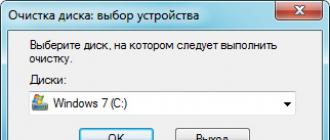This article will be useful for those who are going to do search engine optimization sites and those who are not going to do this. For the first, it is extremely important to know what search engines are and what they are in order to promote high-quality sites that generate income. For the rest, the information will be rather "for general development", which is also necessary.
So, everyone knows that the number of sites on the Internet is truly huge and users need to somehow navigate them. Otherwise, a person will use only those sites that he knows all his life, but where is the guarantee that this is the best site on the network? Initially, people simply shared links to these "best" sites with each other. Later began ordering sites into directories - linkbases sorted by subject. With the help of directories, users could already find sites of interest to themselves, but it was still very difficult to find information. And then the real search engines appeared.
Below we will talk about how the main search engines of the Internet work, about when and how the first search engines in Russia and the world appeared, and there will be a list search engines... Now about everything in order.
Internet search engines are complex programs for finding information on web sites and a web interface for interacting with the user.
The software part of the search engine collects information from sites, processes texts from web pages, stores these texts in a special form, searches through stored texts and displays links to the user. relevant pages in a specific order.
A web interface is a site where a user enters his search query into a special window and receives a search result - links to found pages with a small announcement.
Search query - words entered into a search engine, for example, "list of Internet search engines".
Relevant pages - pages that would satisfy the wishes of the user, that is, they were useful to him, that is, they answered his question and gave a complete answer. Naturally, good search engine should show only relevant pages in the search results, therefore all search engines in the world are constantly improving the search algorithms of their search engine.
In what order do Internet search engines display the result:
The search engines of the world tend to display the most relevant pages at the beginning of the list of links, but the problem is that this process is being done special programs, which naturally have no idea what the user wants to find. Therefore, search engines work approximately as follows: they search among their base of sites for the text of the search query, that is, those words that the user entered. The logic is simple: the more often the words entered by the user are found on the page, the more relevant the page will be to the user's request. Of course, in reality, search engine algorithms are incredibly complex and only developers know them.
Advice to users:When you search for something on the Internet using a search engine, write a request, remembering that the pages in the search engine results will contain the same text. That is, if you write “how can I quit smoking at 20”, then at best the search engine will offer you a link to a forum with such a question, and not at all what you were trying to find. Search as it can be written in articles that are useful to you.
Another problem with search engines on their way to the ideal, relevant SERP is that users are not entering their queries accurately. For example, a user enters "TVs" and in this case it is not clear what he is looking for: a store household appliances, reviews of new models or, in general, an essay about the history of television. But these are already problems of search engines.
Now let's dwell separately on what search engines exist in the world and in Russia, and also look at the list of search engines with a percentage of the audience of users.
It was created by two Stanford University students in 1998. Their names are Larry Page and Sergey Brin. Moreover, the latter gave the name to the new search engine, making a mistake in the word Googol (the number 10 to the 100th degree). Today Google is the largest search engine in the world, with sites in 191 languages.
The largest of the Russian search engines is of course familiar to you - it is Yandex... In 2010 it exceeded 60% of the total search queries in runet. Also in 2010, the company launched the yandex.com search engine and thus entered the international market.
And the general list of search engines in Russia looks like this:
* Yandex (46.3% of Runet)
* Mail.ru (8.9% of Runet)
* Rambler (3.3% of Runet)
* Nigma (0.5% Runet)
* Guenon (0.1% Runet)
* Gogo.ru (<0,1 % Рунета)
* Aport (<0,1 % Рунета)
Here is a list of Russian search engines.
The best search engines on the Internet. Internet search engine – these are special search programs installed on a whole complex of specialized machines. And in a simple way - this is the same site with a set of programs, only on a special search engine (server). It is with the help of search engines that you find all the information you need. There are a lot of search engines.
1. What is an Internet search engine
2. Popular search engines in our country
3. Popular search engines abroad
4. Unusual search engines
5. How to search for information on the Internet correctly
Most best nsearch systems in our country:
http://www.yandex.ru
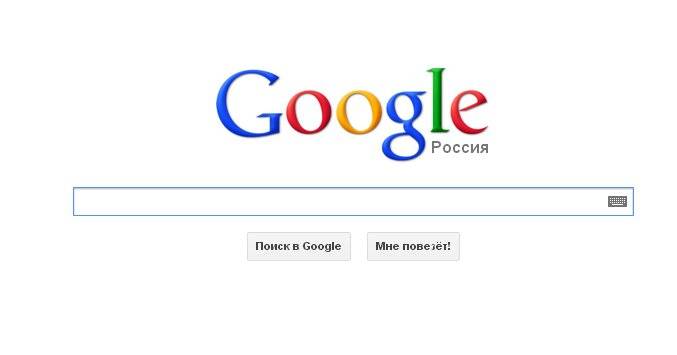
http://www.google.com

http://www.aport.ru

http://www.rambler.ru/

http://go.mail.ru

http://www.webalta.ru/
The most unloved and intrusive search engine.
Popular search engines abroad
http://www.altavista.com
http://www.alltheweb.com
http: // www. bing.com
http://www.google.com
http://www.excite.com
http://www.lycos.com
http://www.mamma.com
http://www.yahoo.com
http://www.dmoz.com
http://www.hotbot.com
http://www.dogpile.com
http://www.netscape.com
http://www.msn.com
http://www.webcrawler.com
http://www.jayde.com
http://www.aol.com
http://www.euroseek.com
http://www.teoma.com
http://www.about.com
http://www.ixquick.com
http://www.lookle.com
http://www.metaeureka.com
http://www.searchspot.com
http://www.slider.com
http://www.allthesites.com
http://www.clickey.com
http://www.galaxy.com
http://brainysearch.com
http://www.orura.com
Each country has its own popular search engines.
Unusual search engines
- DuckDuckGo (https://duckduckgo.com/)- a hybrid search engine with privacy policy of the user and his searches.
![]()
- TinEye (http://tineye.com/) is a search engine that specializes in finding images on the Internet. Recently, it is losing its relevance after Google introduced the same function in its image search.
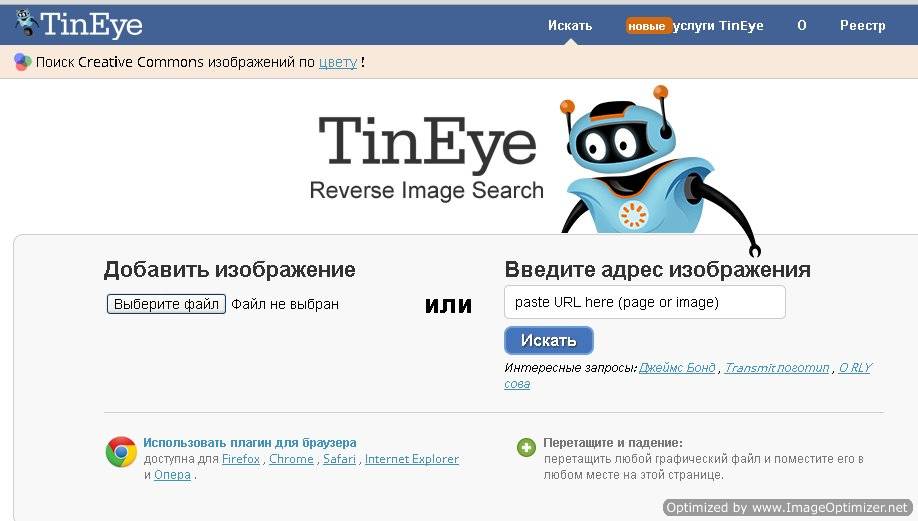
- Guénon (http://www.genon.ru/) is a search engine that collects and creates content on its website.
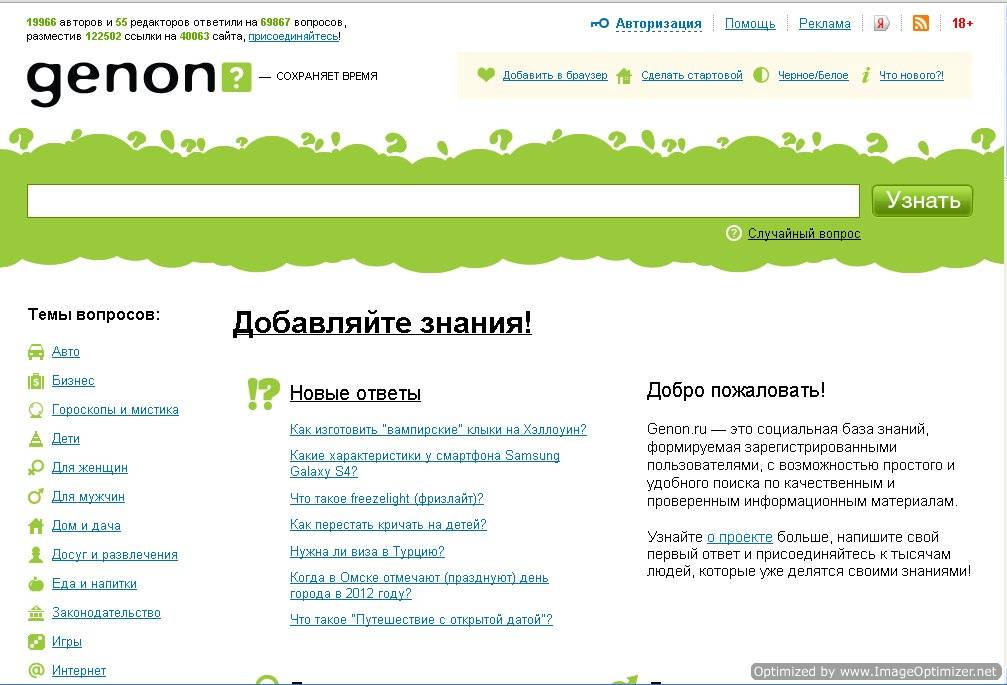
In addition to the search box, almost every search engine contains links to the most popular news sites, and sites of a certain subject.
How to properly search for information on the Internet
Each search engine has its own algorithms (rules) for finding information.
In order to find some information on the Internet through a search engine, you must enter in the search field request... If you enter any one word, then for this request you will be given thousands of links to sites in which this word is mentioned.
Therefore, it is necessary to enter as specific a query as possible, consisting of two, three or more phrases.
Let's look at an example of a search engine query Yandex.
Let's say you want to find information on buying a computer. If you write one word in the search box “ A computer", Then you will be given 133 million answers

It is necessary to ask a more specific request. It is better to indicate which computer you want to buy and where (in which city).
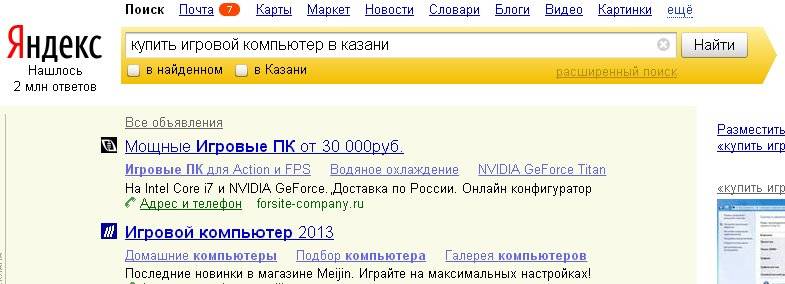
Then the search engine will give you much fewer answers to your query.
The search engine does not really care what letters you enter your query in - big or small.
Yandex distinguishes between nouns and adjectives, but completely ignores endings.
Also, he is completely indifferent to cases, plurals and the like.
In order for the search to be more precise, you need to put the query in quotes or put an exclamation mark before the word.

Now look at the same query, but without the exclamation marks.

See the difference? With exclamation marks, the number of replies is not 2 million, but 186 thousand.
If you put an exclamation mark in front of a word with a capital letter, then you will be given answers in which this very word is found with a capital letter.
If the word is in the nominative case, and you need information on exactly such a word, and exactly as you wrote it, then put two exclamation marks in front of this word. For instance: !!Ball .
The search will give you answers for this particular word " Ball "The way you wrote it. Not " the ball ", not " balls ", And with a capital letter.
If you write a phrase with the word " on ", Yandex will ignore" on ". For instance: " on the shelf ". The search will be performed only by the word " a shelf ».
In order for him to take it into account and not ignore it, it is necessary before the word “ on "Put a plus sign -" + on ».
Each search engine has its own search algorithm, so if you use a specific search engine and want to learn how to correctly compose queries, you just need to type in the search box " search rules inGoogle " or " yandex search rules », Follow the link to answer your request and read the necessary information.
Updated: 28 July 2017
Hello dear readers of the blog site. , then its few users had enough of their own bookmarks. However, as you remember, it happened in a geometric progression, and very soon it became more difficult to navigate in all its diversity.
Then directories appeared (Yahu, Dmoz and others), in which their authors added and sorted various sites into categories. This immediately made life easier for the then, not yet very numerous, users of the global network. Many of these directories are still alive.
But after a while, the sizes of their databases became so large that the developers first thought about creating a search within them, and then about creating an automated system for indexing all Internet content in order to make it available to everyone.
The main search engines of the Russian-speaking segment of the Internet
As you can imagine, this idea was realized with overwhelming success, but, however, everything turned out well only for a handful of selected companies that managed to survive on the Internet. Almost all search engines that appeared on the first wave have now either disappeared, or vegetated, or were bought by more successful competitors.
The search engine is a very complex and, importantly, a very resource-intensive mechanism (meaning not only material resources, but also human resources). Behind the seemingly simple, or its ascetic analogue from Google, there are thousands of employees, hundreds of thousands of servers and many billions of investments that are necessary for this colossus to continue to work and remain competitive.
Entering this market now and starting from scratch is more of a utopia than a real business project. For example, one of the richest corporations in the world, Microsoft, has been trying to gain a foothold in the search market for decades, and only now their search engine Bing is slowly beginning to meet their expectations. And before that there was a whole series of failures and failures.
What can we say about entering this market without any special financial influences. For example, our domestic search engine Nigma has a lot of useful and innovative things in its arsenal, but their attendance is thousands of times inferior to the leaders of the Russian market. For example, take a look at Yandex's daily audience:

In this regard, we can assume that the list of the main (best and most successful) search engines of the Runet and the entire Internet has already been formed and the whole intrigue lies only in who will eat whom in the end, or how their percentage will be distributed if they all survive and stay afloat.
Russian search engine market it is very clearly visible and here, probably, two or three main players and a couple of minor ones can be distinguished. In general, a rather unique situation has developed in Runet, which, as I understand it, repeated itself only in two more countries in the world.
I'm talking about the fact that the search engine Google, having come to Russia in 2004, has not yet been able to take the lead. In fact, they tried to buy Yandex around this period, but something did not work out there, and now "our Russia" together with the Czech Republic and China are the places where the almighty Google, if not defeated, then, in any case, met with serious resistance.
In fact, see the current state of affairs among the best search engines of the Russian Internetanyone can. It will be enough to insert this URL into the address bar of your browser:
Http://www.liveinternet.ru/stat/ru/searches.html?period\u003dmonth;total\u003dyes
The fact is that most of them use it on their sites, and this URL allows you to see the statistics of visitors from various search engines to all sites that belong to the RU domain zone.
After entering the given Url, you will see a picture that is not very attractive and presentable, but it reflects well the essence of the matter. Pay attention to the top five search engines from which sites in Russian receive traffic:
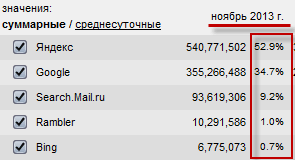
Yes, of course, not all resources with Russian-language content are located in this zone. There are also SU and RF, and common areas such as COM or NET are full of Internet projects focused on Runet, but still, the sample is pretty representative.
This dependency can be formalized in a more colorful way, as, for example, someone on the network did for their presentation:
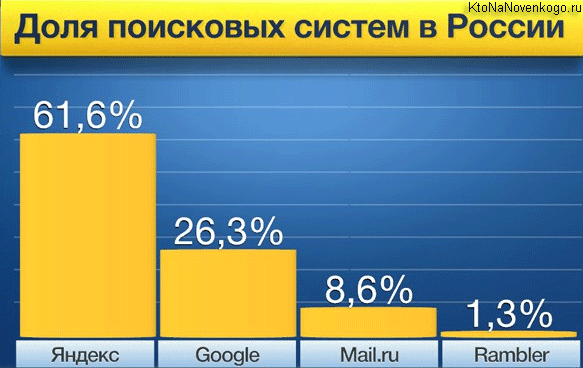
This does not change the essence. There are a couple of leaders and a few very, very lagging search engines. By the way, I have already written about many of them. Sometimes it is quite entertaining to plunge into a success story, or, conversely, delve into the reasons for the failures of once promising search engines.
So, in order of importance for Russia and Runet as a whole, I will list them and give them brief characteristics:
The indexing process itself and the subsequent process of updating the index bases is quite time-consuming. Although Google does it much faster than its competitors, in any case Yandex, which takes a week or two to do this (read about).
Usually, the search engine breaks down the text content of an Internet page into separate words, which leads to basic basics, so that later you can give correct answers to questions asked in different morphological forms. All the extra body kit in the form of Html tags, spaces, etc. things are deleted, and the remaining words are sorted alphabetically and their position in this document is indicated next to them.
Such shnyaga is called a reverse index and allows you to search not on web pages, but on structured data located on the servers of the search engine.
The number of such servers at Yandex (which mostly searches only for Russian-language sites and a bit for Ukrainian and Turkish) is in the tens or even hundreds of thousands, while Google (which searches in hundreds of languages) has millions.
Many servers have copies, which serve both to increase the safety of documents and help to increase the speed of request processing (by balancing the load). Estimate the costs of maintaining this entire farm.
The user's request will be directed by the load balancer to the server segment that is currently the least loaded. Then the analysis of the region from which the user of the search engine sent his request is carried out, and it is morphologically parsed. If a similar query was recently entered in the search bar, then data from the cache is slipped to the user so as not to overload the server.
If the request has not yet been cached, then it is passed to the area where the search engine's index base is located. In response, you will receive a list of all Internet pages that have at least some relation to the request. Not only direct occurrences are taken into account, but also other morphological forms, as well as synonyms, homonyms, etc. things.
Them need to rank,and at this stage the algorithm (artificial intelligence) comes into play. In fact, the user's request is multiplied by all possible options for its interpretation, and answers to many requests are simultaneously sought (due to the use of query language operators, some of which are also available to ordinary users).
As a rule, the search results contain one page from each site (sometimes more). are now very complex and take into account many factors. In addition, to correct them, and are used, which manually evaluate the reference sites, which allows you to adjust the operation of the algorithm as a whole.
In general, it is clear that this is a dark matter. One can talk about this for a long time, but it is also understood that user satisfaction with a search engine is achieved, oh, how difficult it is. And there will always be those who do not like something, like, for example, you and me, dear readers.
Good luck to you! See you soon on the pages of the blog site How search engines work - snippets, reverse search algorithm, page indexing, and how Yandex works
 How to check a website for broken links - Xenu Link Sleuth, Broken Link Checker plugin and online service, as well as search engines
How to check a website for broken links - Xenu Link Sleuth, Broken Link Checker plugin and online service, as well as search engines
 Electronic money of Russia and the Russian Internet, as well as wallets in international payment systems Paypal - what is it, registration, replenishment of an account and how to use it, as well as how to withdraw money from Paypal in Russia Bing webmaster - a center for webmasters from the Bing search engine
Electronic money of Russia and the Russian Internet, as well as wallets in international payment systems Paypal - what is it, registration, replenishment of an account and how to use it, as well as how to withdraw money from Paypal in Russia Bing webmaster - a center for webmasters from the Bing search engine
As you probably already know, the general method of using search engines is quite simple: I went to the search engine site, entered the desired word (phrase), pressed “Enter” (or the “Find” button) - get the result - a list of links to the Internet pages containing the word or phrase you specified.
The difficulty lies in the details that really matter: how to avoid the "garbage heap" in search results; how to make the search engine find exactly the reference you need for the word (phrase) you are looking for, and not all references in a row across all Internet sites; why in the list of found resources the most necessary and interesting sites are far from being in the first place. And also why the search engine did not find anything useful at all, although you know for sure that this information is on the Internet, and several dozen more "why?" And How?".
Earlier it was said that the best and most used Russian search sites are Google (Google), Yandex (Yandex), [email protected], Rambler (Rambler). The best foreign search engines are www.Google.com and www.yahoo.com. It should be borne in mind that all these search engines have their own individual characteristics.
To begin with, their "coverage areas" may differ - Internet spaces that are indexed by search engines, that is, studied by them, and it is on which the search is performed.
- Search engines usually have three components:
- programs - a robot (spider) that moves around the network and collects information about its resources;
- a database that contains information about network resources collected by a crawler;
- search engine that serves to interact with the user database.
Spider crawlers retrieve and index (evaluate) various types of information as they wander the web. Moreover, various robotic programs have their own search characteristics and priorities. Some of them index every word in the document, others only the most common words. In general, a document is indexed according to many parameters: the number of words in the document, the size of the document, its title, titles, links, etc.
Usually search robots work "on a tip", that is, the creator of a web page writes a request to a search engine with a request to index his document. A search robot is sent to the URL specified by it and does its job.
But search spider robots can independently navigate the web by clicking on links in the documents they visit.
The robots put the collected information into a database with which the user interacts by performing a search. Each search engine has its own database, while most of the information in it may be the same as that of other search engines, but there are also significant differences.
It is also important how the search engine sorts the results found (placing some web pages at the beginning of the list, and others at the end -).






